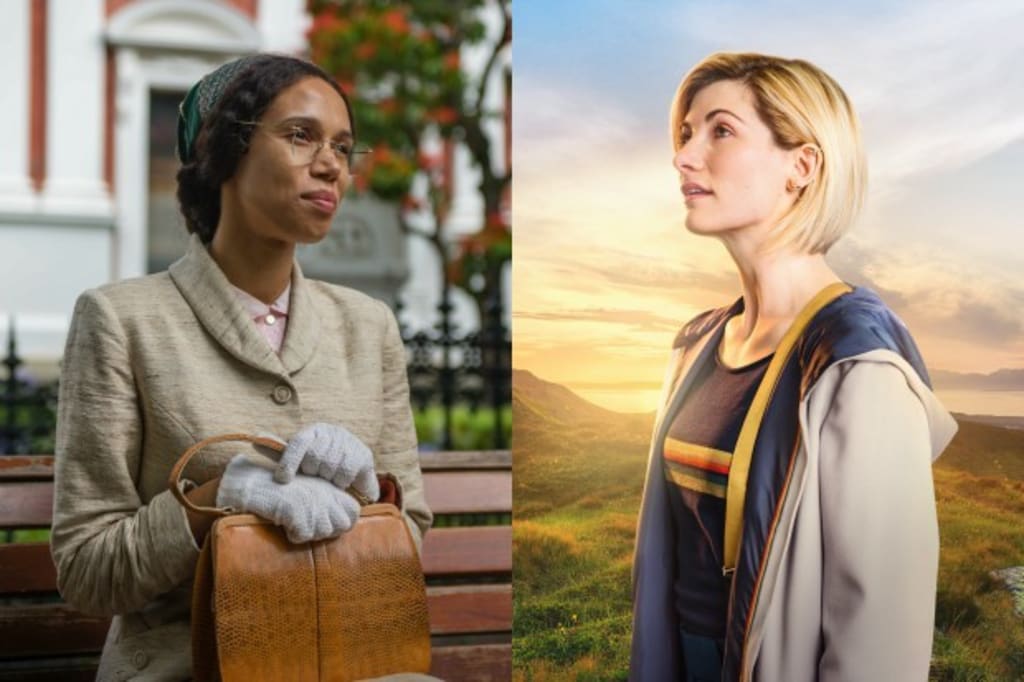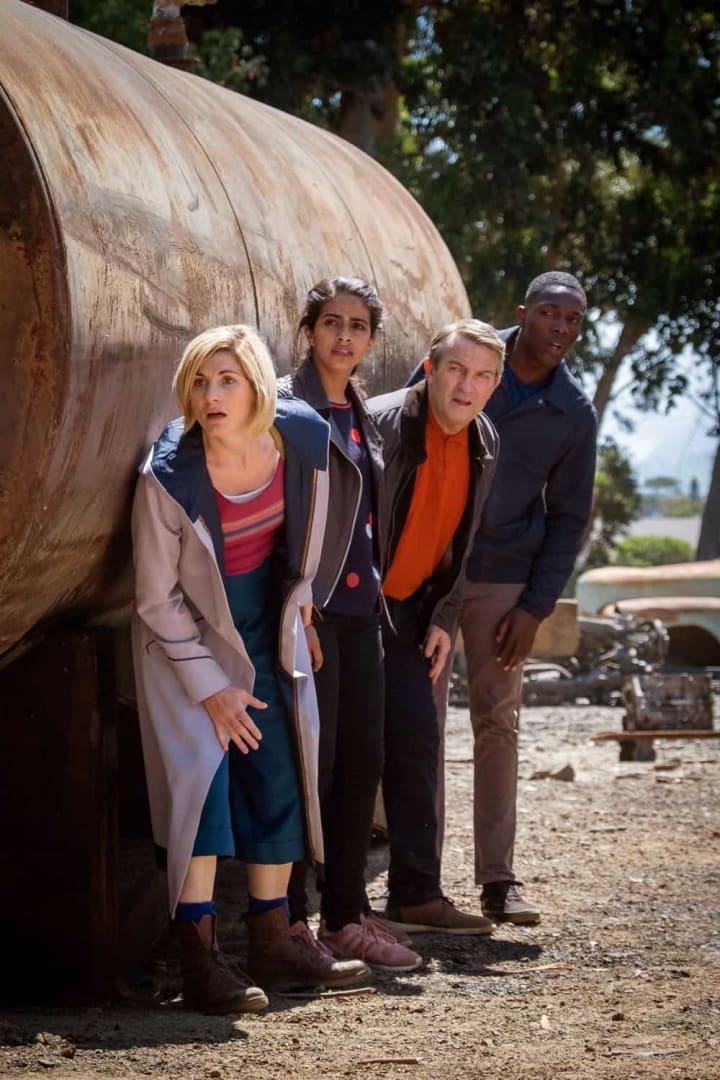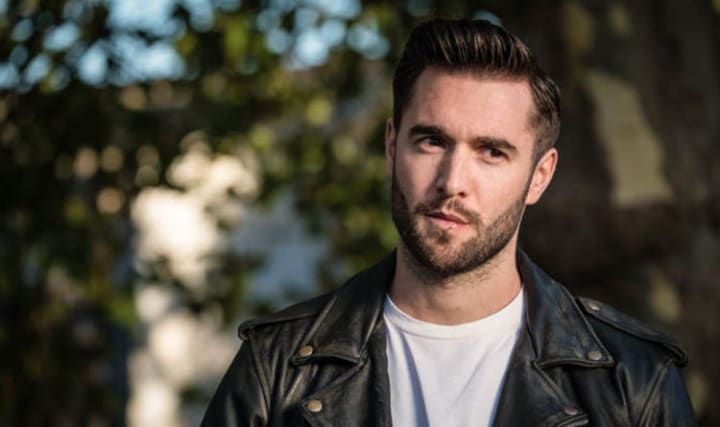'Doctor Who': "Rosa" Review
The Series' Trip Back to 1955 Alabama Is the First Certifiable Home Run of the Chibnall Era

When Doctor Who began in 1963, its creators intended for it to be at least semi-educational. Indeed, it was part of the reason why time travel became a part of the show's fabric with historical adventures involving Marco Polo and the French Revolution being among the show's earliest outings. While the educational intent had considerably faded by the end of the 1960s, time traveling and the idea of meeting historical figures have remained part of the fabric of the show even into its 21st Century regeneration, often involving romps with people such as Charles Dickens or Agatha Christie. It's something which former UK Children's Laureate Malorie Blackman and new showrunner Chirs Chibnall also use in "Rosa," the season's third episode.
On the surface, it was an episode fraught with potential difficulties. As the title might imply, Blackman and Chibnall had picked as their subject matter American Civil Rights activist Rosa Parks and her 1955 stand against segregation on buses in Montgomery, Alabama. Given that the decision of Jodie Whittaker as the traditionally male Doctor had led to accusations of the BBC and Chibnall of being "SJWs" (social justice warriors) trying to make the program more "PC", it was contentious the moment rumors began to swirl about it. On the other side of the equation were those wondering if a British TV program could do justice to a pivotal moment in American history, especially given Who's history of questionable recreations of the country's past alongside rubbish American accents (perhaps reaching its nadir with the 2001 Big Finish audio drama "Minuet In Hell"). As someone born, raised, and still living in Alabama where I help organize a Doctor Who convention, I'll admit I had reservations of my own. Could script and production rise to the occasion? Or would they flounder under the weight of trying to do so much?

TARDIS team on a mission: The Doctor (Jodie Whittaker) and companions trying to keep history on track in a promotional image for the episode.
To tell their story, Blackman and Chibnall draw on elements from the better historically themed Who tales. They focus the episode on rich characterization and presenting the period, choosing not to look past the uncomfortable details of yesterday (as had happened in tales such as 2007s "Daleks In Manhattan" two-parter) but to confront them head-on, using Rosa Parks to do so. The writing creates the feeling of being outsiders, that history is indeed another country as Doctor Who had explored in stories such as "Human Nature"/"Family of Blood." Except that someone wants to change it with the TARDIS crew being in a position of having to keep history on track. In some ways, Rosa as an episode isn't too dissimilar from the acclaimed 2010 episode "Vincent and the Doctor" where a historical figure was at the center of the plot with a science fiction threat looming in the background as a McGuffin of sorts.
That's something which offers both pros and cons. The positive side of it is that it allows a focus on the real-life figure and the period in question. In that, the episode succeeds magnificently between Vinette Robinson's quiet but determined performance in the title role and in creating the sense for viewers and TARDIS crew alike of being on the edge of history happening. It makes moments such as Ryan meeting some significant people or indeed the episode's climax all the more impactful. Even better, the writing avoids the cliche of having the time travelers responsible for events, instead of allowing the power of the historical moment to be the source of the drama. Indeed, the episode draws tension from IF history will play out as it should and not from our characters inspiring it to happen. It's a wise move and one that pays off in the episode itself.

A McGuffin Villain: Joshua Bowman as Krasko.
There is a downside, however. The threat to history, Joshua Bowman's Krasko, is exactly that but he's not much else. He's a presence, one that allows the series to make some subtle references to its past but his motives are unclear and the reasons behind exactly why he's pursuing his particular course of action becoming clear late in the proverbial day. As stated above, he's a McGuffin, something which sets the plot in motion, more than anything else. There are some excellent moments of confrontation involving Bowman and Whittaker's Doctor proving she can stand up to a foe such as well as her male predecessors but, on the whole, the villainous Krasko takes a backseat to the pretty detestable social attitudes of the episode's setting.
Even better, the script comes to life superbly. The high-end production values that have been a hallmark of the season thus far are very much on display in this episode. The recreation of 1950s Montgomery feels spot on to someone familiar with the city in more modern times with an abundance of period detail on display from buses to set dressings. The cinematic stylings and camera choices remain, helping to add to the feeling of the show recreating the past more convincingly than it sometimes has in the past (looking to the "Daleks In Manhattan" two-parter once again). The accents too are acceptable, more on the convincing side of the spectrum than the sometimes cartoonish ones that Doctor Who has often employed in the past. The supporting cast is solid from Robinson as Parks to Trevor White as bus driver James Blake as well as those in smaller roles. The result helps to give the episode the feeling not of a TV series recreating the past but of a proper period feature film like Hidden Figures.
By the end of the closing credits, "Rosa" feels like the first certifiable home run of the Chibnall era. Though it's villain is essentially a McGuffin, the quality of the script and production shine through. It's a compelling story of a pivotal moment and the woman behind it, one told within what is (notionally at least) a sci-fi thriller plot. It's also a prime example of what Doctor Who can be at its best and that is something rare indeed.
About the Creator
Matthew Kresal
Matthew Kresal was born and raised in North Alabama though he never developed a Southern accent. His essays have been featured in numerous books and his first novel Our Man on the Hill was published by Sea Lion Press in 2021.






Comments
There are no comments for this story
Be the first to respond and start the conversation.